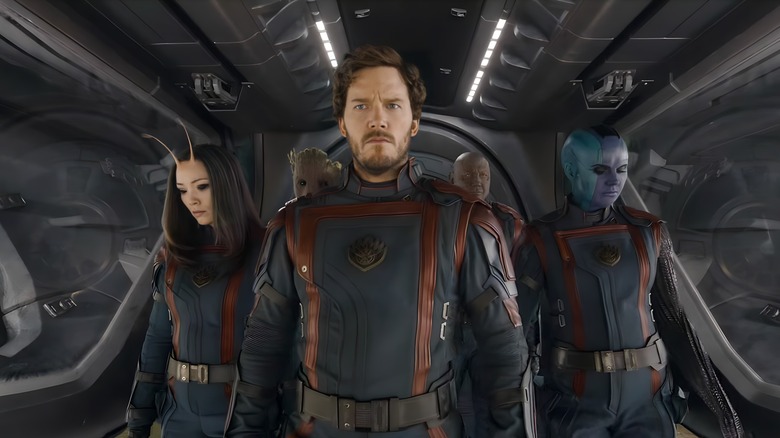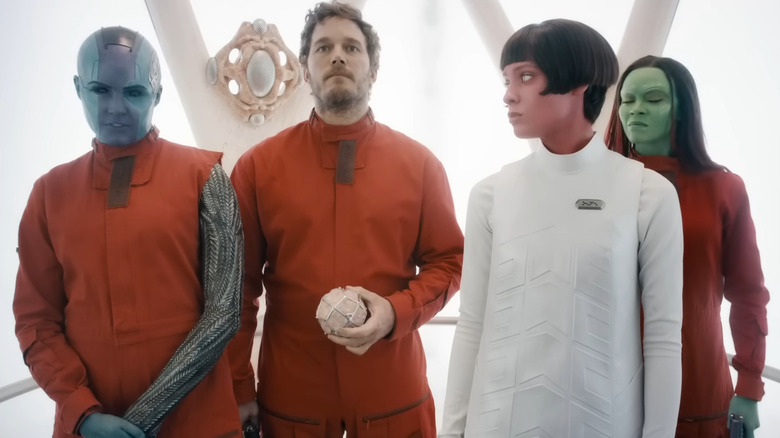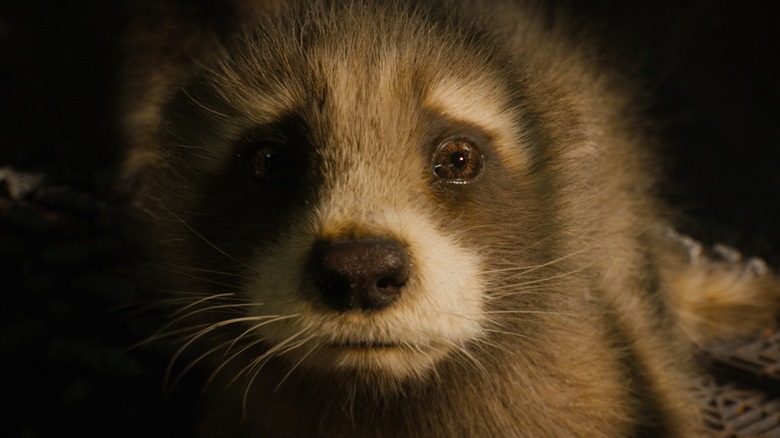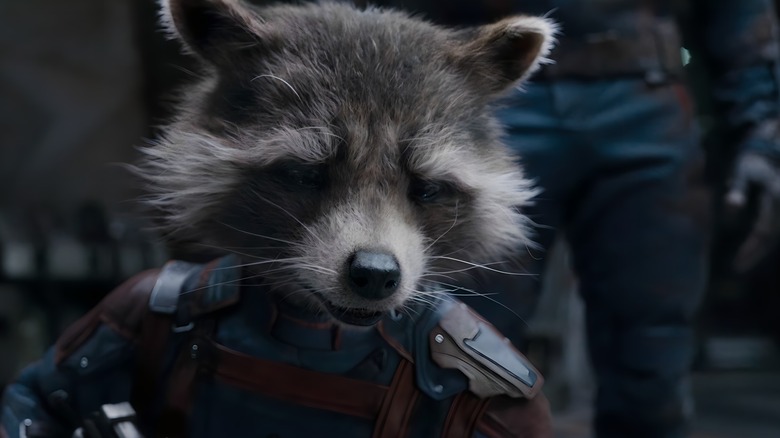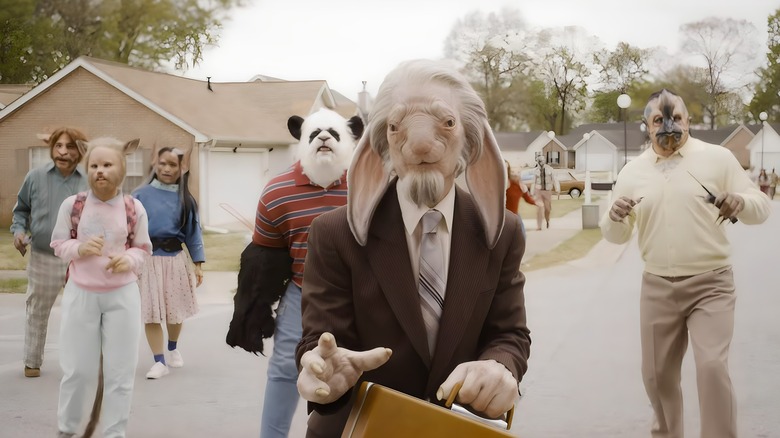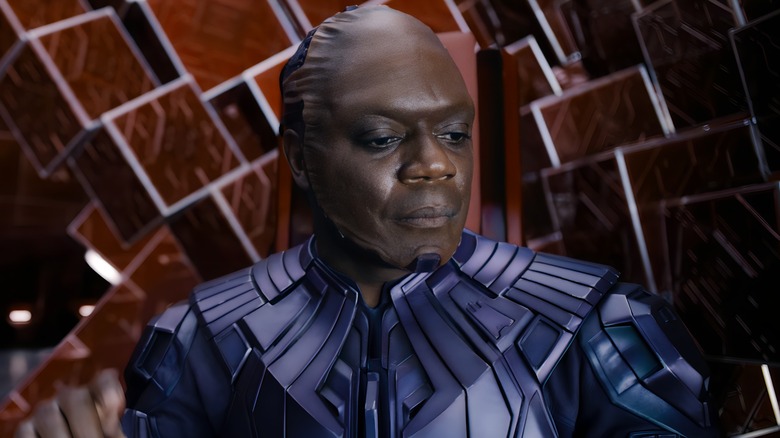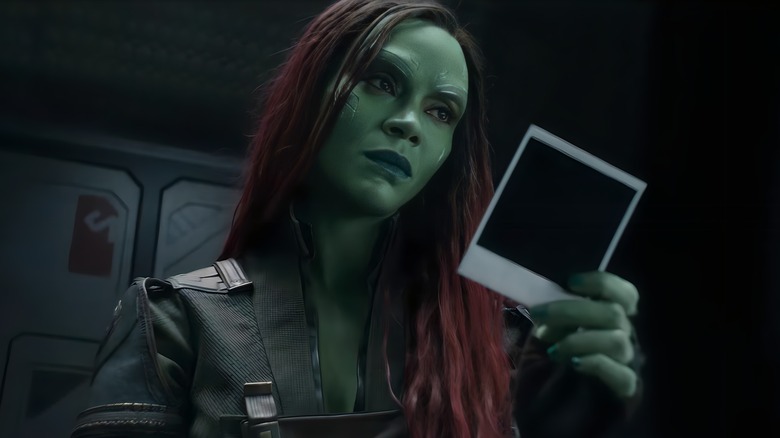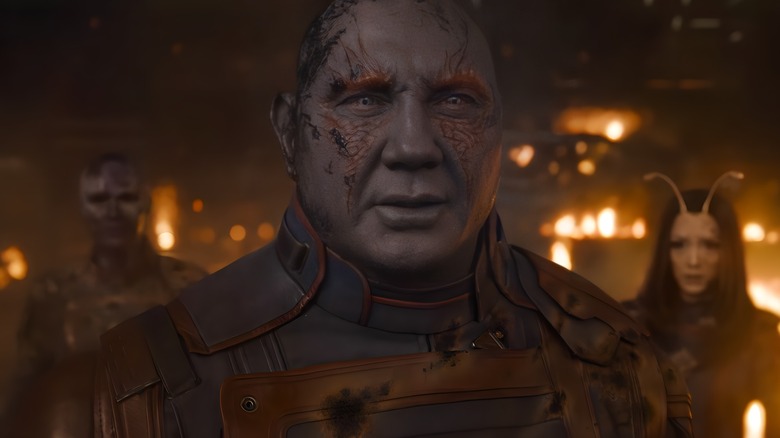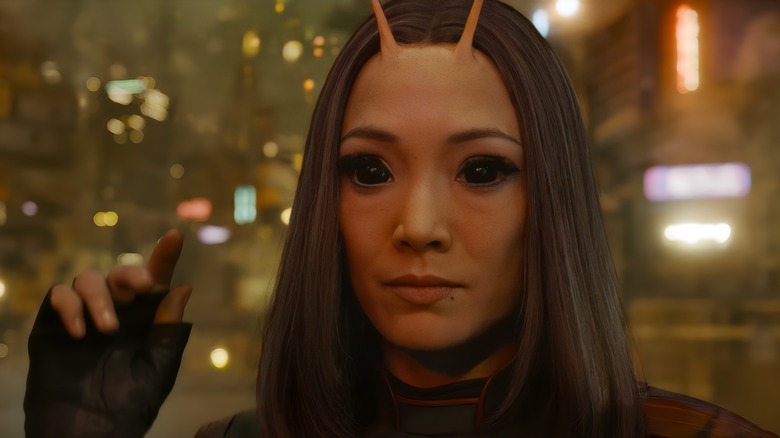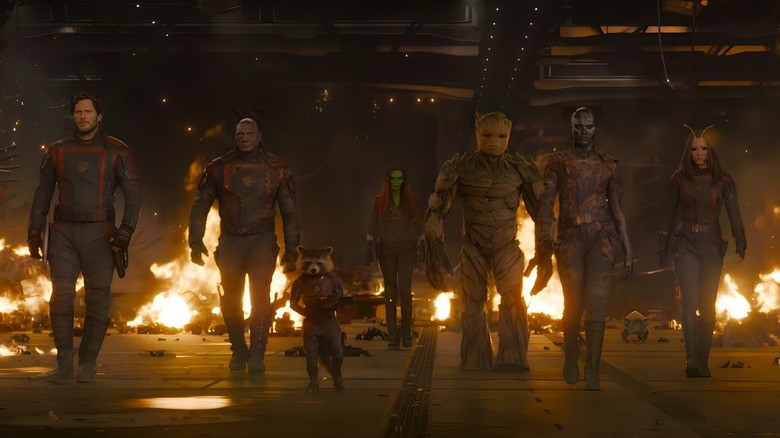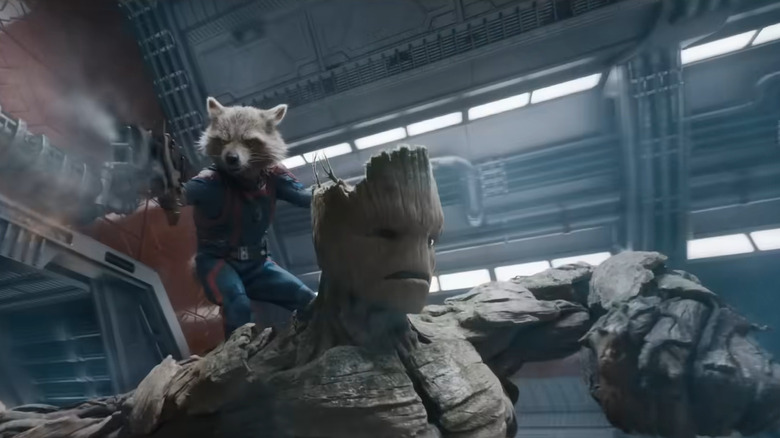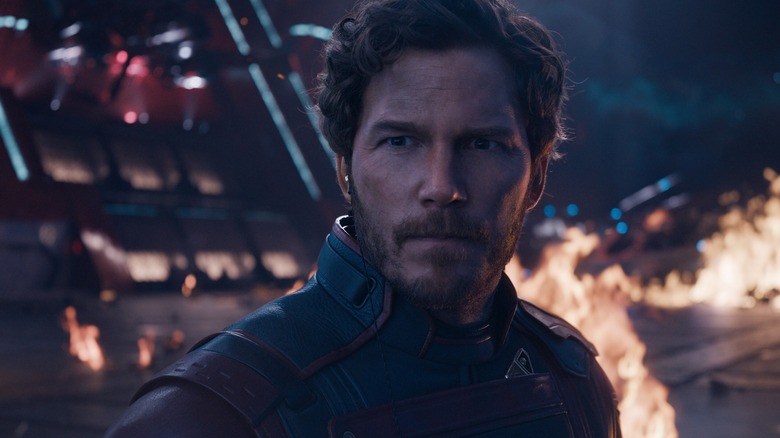Biggest Unanswered Questions In Guardians Of The Galaxy Vol. 3
Warning: This article contains spoilers for "Guardians of the Galaxy Vol. 3"
Back in 2014, the biggest unanswered question surrounding "Guardians of the Galaxy" was whether or not it would even work. The MCU had found success with big heroes like Thor, Iron Man, and Captain America, and "The Avengers" proved the merit in the bold vision of the franchise. But introducing an obscure superhero team that most folks outside comic book circles had never even heard of? That was a big risk. With character names like Rocket Raccoon and a talking tree called Groot, it seemed likely to be Marvel Studios' first bust.
Of course, that's not what happened. James Gunn's sci-fi adventure quickly entered the comic book movie hall of fame, underscored by a bumping retro pop soundtrack that others have been aping ever since. And now, with "Guardians of the Galaxy Vol. 3," the story of Star-Lord (Chris Pratt), Gamora (Zoe Saldaña), Rocket (Bradley Cooper), Drax (Dave Bautista), and the rest of the gang has come to a climactic and satisfying conclusion — at least for now.
Like its predecessors, "Vol. 3" is a fun, colorful, and emotionally poignant story, this time with Rocket at the center. The Guardians' battle against the High Evolutionary (Chukwudi Iwuji) wraps up their arcs nicely, but the movie doesn't quite tie up every loose thread. Here are the biggest unanswered questions in "Guardians of the Galaxy Vol. 3" and some possible answers.
Why do so many of the aliens look human?
Space: It's huge. But not so huge that the aliens ever look all that different from humans, apparently. As has always been the case in the MCU (even in the Quantum Realm), half the species in "Guardians of the Galaxy Vol. 3" are basically regular people with face paint. And a lot of them didn't even check into hair and makeup.
Many of the extras on Knowhere, Nathan Fillion's Master Karja, and even the High Evolutionary himself all appear to be Earthlings, yet they aren't. Again, that isn't anything new for the franchise, but it feels particularly strange this time around. The High Evolutionary is clearly not from Earth (though he is in the comics), as he talks about having "visited" the planet once. And yet, he appears to be a normal man, and he crafts his "Counter-Earth" in its namesake's image. He even fills it with evolved versions of Earth animals!
There are theories of why this is, including ones involving the Space Stone sending humans to far corners of the galaxy. But the real answer, unfortunately, is probably just ease of production. It's not unusual for sci-fi movies to fill half the galaxy with humans, as any "Star Wars" fan will tell you. But then again, Earth doesn't exist in "Star Wars," so it doesn't feel quite so strange. A little more makeup would have gone a long way toward the cosmic worldbuilding of the MCU, but "Vol. 3" also had a chance to explain all the humans in a way that connects to the story. Instead, their presence remains a mystery.
Why is Rocket so smart?
Over the course of "Guardians of the Galaxy Vol. 3," Rocket's whole tragic backstory trickles out. The film opens with a shot of him as a baby raccoon in a cage — the only one of his little litter who faces his captors when they come instead of turning his back. Piece by piece, we see him getting experimented on, learning to speak, growing older, making friends, and ultimately losing them at the hands of the High Evolutionary. It's a rough ride to watch, though Rocket thankfully reaches a much better place by the end of the movie.
Perhaps the most curious thing revealed in the flashbacks, however, is just how special Rocket actually is. As only a kid, he identifies a huge flaw in the High Evolutionary's bioengineering tech. Thanks to his keen eye, the process is fixed, and the villain's plan for a "perfect species" moves forward. Unfortunately, Rocket's technical brilliance also puts a target on his back.
The High Evolutionary becomes obsessed with Rocket's intelligence. He can't understand how a being he "created" could have found a problem he himself couldn't identify. The whole thing could be written off as Rocket simply having a sharp mechanical mind, but is there something more going on here? The High Evolutionary has created countless creatures and tested them all in myriad ways. If Rocket truly is the only one to ever generate such an original idea, that makes him incredibly unique, but the film stops short of explaining why that's the case.
Is Rocket's vision of heaven real?
The Guardians save Rocket from his grievous injuries, but just barely. By the time Star-Lord and Gamora upload the passkey that allows him to receive medical treatment, he's already got one foot on the other side. This leads to a curious scene in which Rocket talks to Lylla (Linda Cardellini) — his fellow test subject, former friend, and implied love interest — in a white void.
Essentially, she tells him that she's in a Heavenly paradise and that their other friends who died are also there. Rocket says he wants to join them, but she reminds him that he can't just yet because he still has work to do in the land of the living. "This story has been yours all along," she tells him. "You just didn't know it." And then he wakes.
The big question here, of course, is what's actually going on? Is this a true vision of the afterlife? Or is it merely a hallucination in Rocket's mind — a delusion caused by his near-death experience? The MCU has given no hints that a traditionally imagined Heaven exists in its cosmic scope, but when gods, aliens, and primordial beings are all around, who's to say there couldn't be one?
How did Thanos effect the High Evolutionary?
Aside from its core character arcs pulling heavily from "Avengers: Infinity War" and "Endgame," "Guardians of the Galaxy Vol. 3" doesn't connect much to the rest of the MCU. That ends up working to its benefit, as the film feels more independent and less like a nexus point for cameos and future set-ups. However, there are times when it feels downright odd how separate the story is. There are no references to the multiverse, no chaos magic, and hardly any nods to Phase 4, period.
Even more curious is the lack of reference to Thanos. Or rather, Nebula (Karen Gillan) and Gamora reference Thanos because he was their "father," but there are no real allusions to the snap. When Thanos used the Infinity Gauntlet, he didn't just wipe out half of all sentient life on Earth; he did it everywhere. You'd think that would have an effect on someone trying to create whole new species and societies, but the High Evolutionary never brings it up.
To be fair, the Infinity Saga is over, and the MCU simply may not be interested in dealing with it any longer. But it would have been interesting and relevant to hear how the snap impacted the High Evolutionary's plans. He's obsessive with his work and sees himself as a god. How did it make him feel when half of all his experiments vanished in an instant?
Is the High Evolutionary truly dead?
The High Evolutionary is a despicable villain, but he gets his comeuppance in the end. His subordinates rebel against him, the Guardians destroy his ship, and when Rocket finally confronts him, the raccoon takes him down easily — with a little help from his friends, of course. The thing is, Rocket chooses not to land a killing blow on his tormentor. He's a Guardian of the Galaxy, not a killer, and he chooses to help get all the animals out instead.
The High Evolutionary is in rough shape when they leave him, and his ship completely explodes soon after. It seems impossible that he could have survived, but without a definitive kill shot, we can't say for sure. Could he return to the MCU in the future? Of course, he could. Will he? Probably not. He has no connection to the big-picture plot in Marvel's Phase 5, and it doesn't seem like he'd have a reason to go up against any other notable Marvel heroes. Since there are no plans at the moment for a fourth "Guardians of the Galaxy" movie, that would seem to quash any chance of a High Evolutionary revenge story. But it could happen!
Will Peter and Gamora ever get back together?
If you went into "Guardians of the Galaxy Vol. 3" expecting Star-Lord and the new Gamora to get back together, you might be a little disappointed. Though the two share some tender moments, Gamora never quite returns to her old self. She emphasizes repeatedly that she can only be the person she is now: one with a very different set of experiences and perspectives on the world. Though she reconnects with the other Guardians and befriends them again by the end of the movie, she never actually rejoins the team.
In the final moments of "Vol. 3," Gamora returns to her new Ravager family, where she's welcomed with revelry and open arms. She seems to enjoy that new lifestyle, which, to be fair, isn't so different from being in the Guardians. But before she leaves, she does express a bit of regret that she can't be the person who once loved Peter again.
Could these two crazy kids ever figure it out? It's possible. Who knows what wild cosmic circumstances might bring them crashing back together down the line? However, because "Vol. 3" feels like such a definitive endpoint, a reunion for Quill and Gamora seems unlikely. The whole movie has a theme of growing beyond your worst moments — of letting the past go to embrace the future. Peter accepting that his Gamora is gone is a big part of that message, and it would cheapen the story to undo it.
What will become of Knowhere under Nebula and Drax?
By the end of "Guardians of the Galaxy Vol. 3," the population of Knowhere has grown exponentially. Refugees of all species from the High Evolutionary's ship now call the floating head home, and they have a fearless new leader in Nebula.
The blue-skinned cyborg who once wanted nothing more than to murder and destroy has become the mayor of space town, and she fits the job surprisingly well. Nebula arguably has the biggest arc of any of the main characters, and she feels more like the leader through "Vol. 3" than Star-Lord. She also recruits Drax to help her build the new "city" of Knowhere, as he's naturally good with kids and will make a perfect paternal figure for the community. "You weren't born to be a destroyer," she tells him at one point. "You were born to be a dad."
Under their guiding hands, Knowhere seems destined for great things, or at least peace. But what exactly this new society will look like remains unclear. Knowhere is naturally nomadic, so could it become a rescue vessel for other refugees and people in need? Will all of the High Evolutionary's prisoners remain there, or will Nebula embark on a great mission to return them all to their rightful homes? And perhaps most importantly, will Knowhere pop up again in the MCU, floating through the cosmos? Only time will tell.
Where will Mantis go?
The "Guardians of the Galaxy Vol. 3" script finally treats Mantis (Pom Klementieff) as an equal to the others, and she shines in the spotlight. But when all is said and done, she decides to split off from the group and travel alone for a while, taking the High Evolutionary's giant Abilisks with her. She says that her whole life, she's only followed others, and that it's time for her to forge her own path and discover what she actually wants out of life. It's a nice moment for a character who's usually caught up in other people's emotional lives, but it's unknown where she'll go.
To be fair, Even Mantis doesn't know where her journey will take her. That's kind of the point. After being freed from Ego and traveling the galaxy with the Guardians, she finally has a chance to discover things in her own way and her own time. Could she pop up in another space-set Marvel movie later on in Phase 5 or beyond? Of course. Disney has never shied away from bringing back characters, even if they haven't been on screen for years. Plus, since Star-Lord and Mantis are half-siblings, they'll always have a reason to reunite. Judging from the film's post-credits scene, it seems that Peter will be sticking around in the MCU for a while longer, and Mantis could be part of that next arc.
Will the old Guardians of the Galaxy reunite?
It's not just Mantis who goes her own way at the end of "Guardians of the Galaxy Vol. 3." By all definitions of the phrase, the squad breaks up. Star-Lord returns to Earth to reconnect with his grandfather, Nebula and Drax stay on Knowhere to lead the community there and build the new city, and Gamora returns to the Ravagers. A new team is formed, led by Rocket and composed of Kraglin (Sean Gunn), Cosmo the Spacedog (Maria Bakalova), Adam Warlock (Will Poulter), his pet Blurp, and Groot. One of the kids from the High Evolutionary's ship, credited as Phyla (Kai Zen), also joins the gang. Given her name and superhuman abilities, it's likely that she's actually the powerful Phyla-Vell from the comics.
This new team is plenty of fun, and Rocket seems to be a great leader, even starting off missions with ice-breaker questions about everyone's favorite music. But it's hard not to wonder if the original Guardians will ever properly reunite. It would be simple enough to get Nebula, Drax, Rocket, and Groot back together, as the new team likely still hangs out on Knowhere. And Star-Lord will surely return to action sooner or later after a well-earned break back home.
Mantis and Gamora, though, are harder to pin down. The former has a strong connection with Drax that could compel her to rejoin him on Knowhere, and Gamora still has a sister in Nebula. But with James Gunn now leading DC's cinematic efforts and the MCU moving into new territory, there's no guarantee that we'll ever see the original Guardians squad together again.
How big can Groot get?
Perhaps the most startling thing about the mid-credits scene in "Guardians of the Galaxy Vol. 3" is how big Groot is. As Rocket and the new team chat about their favorite songs, they appear to be sitting next to a large rock. But no, that's actually Groot, who's grown to a truly gargantuan size.
He's still relatively young in this scene, having only sprouted several years prior at the end of the first film. However, the previous incarnation of Groot never grew to such a natural size. In "Vol. 3," the tree alien does appear rather different from his counterpart in the original movie. He's fully mature, but also much beefier than his tall, lanky predecessor. It's possible that the first version of Groot was in a later stage of life — still powerful, but older. Maybe that's why he was so willing to give his life to protect others. Or perhaps growing up around the Guardians for his whole life set the new Groot on a different physical path. Regardless, there's one big question everyone must be asking: How big can Groot get, exactly?
In the "Vol. 3" mid-credits scene, he looks more like a mountain than a tree, and there's no telling how much larger he could get. Eventually, transportation could become a problem if the guy keeps bulking up, as spaceships only come so big.
Where will Star-Lord show up next?
After a brief post-credits scene of Star-Lord relaxing with his grandfather back on Earth, a final message promises that the character will be back in the MCU. Naming Peter in particular would seem to suggest that the other Guardians are gone for now, which makes sense. Their stories have all wrapped up, for the most part, and they've gone their separate ways. But while there may not be another "Guardians of the Galaxy" movie, Star-Lord's run is not yet done.
There are a number of places where Quill could pop up in the future. "The Marvels" will feature another cosmic MCU story, and anywhere there are aliens, Star-Lord could appear. That seems extra likely if the Phyla seen in "Vol. 3" actually is Phyla-Vell, who bears the moniker of Captain Marvel at various points in the comics. We don't know much yet about "Captain America: New World Order," but that could also be an upcoming venue for a Star-Lord cameo. Since Peter is back on Earth — and in America, no less — he could easily fall into whatever shenanigans Sam Wilson (Anthony Mackie) gets up to next.
Alternatively, Star-Lord could be held in reserve for one of the next big MCU crossover events, like the impending "Secret Wars" series or "Avengers: The Kang Dynasty." It's impossible to know for sure, but the former Ravager from Missouri will be back sooner or later.
